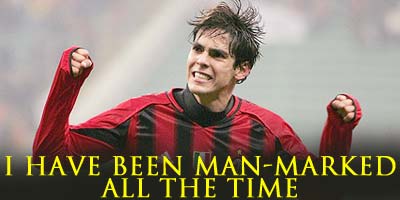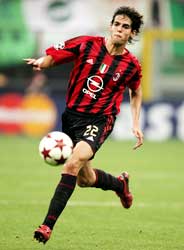
He is only 22 years old but with a World Cup winners' medal and an Italian league title already to his name Brazilian Ricardo Kaka could be forgiven for thinking he had nothing more to prove.
After struggling early this season, the AC Milan midfielder has had to show that he is capable of dealing with the close attention of man-markers and the impatience of the media and public opinion.
Kaka is not only the key creative force for the Italian champions, he is the face of the new Brazil, who already look strong favourites for the 2006 World Cup. It is a lot of responsibility for a player who has been in European football for only 15 months.
Young Latin Americans often find it hard to initially settle in European soccer but Kaka made an instant impact last season with his 10 goals and a series of outstanding displays helping to guide Milan to the title.
It has been a rapid rise from the youth team of Brazilian club Sao Paulo to his current status as one of the brightest talents in the game but this season, for the first time in his career, Kaka has found it hard going.
"It has been more difficult than last year," Kaka said. "I am known in Italy now, the markers know me and they are tough here. The past two or three months haven't gone so well."
Inevitably his form was scrutinised closely and he came in for some criticism in the Italian media but he says he was unfazed by the novelty of negativity.
"That wasn't a problem. I know I am young and I always say I have a lot to learn but I have also learnt quite a lot already. I know things are like that in football. When things go well everyone talks well of you and vice versa. Unfortunately football is like that," he said.
MARKED MAN
But while indifferent to public criticism, he says he knew he had to adapt to the challenge of being a marked man and believes that, rather than suffering from a slump in form, he has been restricted thanks to alert opposition coaches.
"In Italy the coaches are very attentive to the details. They really study things and that is a big difference here. They look at your movement, your positioning, they study you and work out how to stop you.
 "So this year I have been man-marked all the time and often double-marked," he said.
"So this year I have been man-marked all the time and often double-marked," he said.
Recently he has looked back to his best and in last week's 4-0 Champions League win over Shakhtar Donetsk he scored twice and created another goal, showing once more the light-footed skills, imagination and fluent movement that contrast with the power play that dominates so many games.
"Yes things have got better for me and the team in the past couple of weeks. I've had to change a few things to deal with the markers but I'm not going to say what," he said with a grin.
Increasingly Kaka has been given licence to move out to the flanks and begin his pacey attacks on defences from wide positions -- at the same time dragging his marker, or markers, out of position and leaving space for team mates such as Rui Costa and Clarence Seedorf to exploit.
What has not changed is Kaka's approach to the game and to life in general.
At first glance he appears the model of the modern footballer -- always in a smart suit, with a telegenic smile and a lucrative sponsorship deal with a sportswear company.
POSITIVE DIFFERENCE
But, refreshingly, in an era when many feel that money has stolen the soul of the game, Kaka is a footballer who believes responsibilities come with his status and that he can use his position to make a positive difference for those who do not enjoy his wealth.
This week he was appointed an 'ambassador' for the United Nations World Food Programme, a role he took on after he was shocked by statistics on the number of children in the developing world who die from hunger.
Unlike many Brazilian players Kaka did not grow up in poverty and comes from a comfortable, middle-class family but, like many of his compatriots, he believes footballers have a duty to help the poor and wants to see more people in the game take on such roles.
"In Brazil we think we can help by using our image, the fact that we are very well known, to help others.
"I think lots of footballers want to do something but many don't know how. I was contacted about the ambassador role and I thought that it was a way I could do something," he said.
Kaka said his desire to help fight hunger had its origins in his experiences as a player.
"It has been tough when I have been with the national team and we have gone to play in some of the poorer areas in Brazil.
"You see people come and watch us train or play a match and then you know some of them are going home with no food on the plate," he said.
Reuters








 © 2025
© 2025